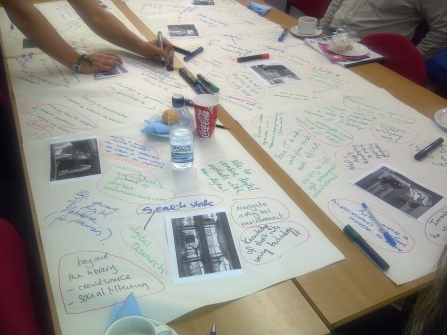Very exciting developments today at the Faculty of Humanities and Social Sciences ‘creative think tank’ event! One of the PriDE project’s biggest assumptions was that definitions of digital literacies will differ based on subject/disciplinary differences. So, having run two think tank sessions in two very diverse faculties so far, it is great to see differences starting to emerge in the ways in which digital literacies are defined as well as in the in which the workshop tasks were approached by the participants. This event has provided plenty of food for thought in relation to two of our project deliverables (mapping disciplinary differences and effective change management strategies).

- Humanities and Social Sciences creative think tank
Another interesting outcome was the notion of an ‘interim professional environment’ which arose from the discussions. Participants noted that higher education enables learners in this faculty to develop their practices and identities in a safe environment, which through authentic tasks enables learning take place ‘on the job’ (or via simulations and role play). Health, education, psychology etc. are all fields which require a high degree of professionalism, ethical awareness and a reflective approach on a daily basis. Students can only learn to become professionals in these areas within a safe ‘interim professional environment’ before they go out into the work place where their practice will have significant consequences. It is within this ‘interim professional environment’ in which digital literacies are being developed. It will be interesting to see whether this notion manifests in discussions with other subject areas…

